When Love Meets Tragedy: The Most Heartbreaking Myths
Introduction: The Intersection of Love and Tragedy in Mythology
Love and tragedy are two of the most powerful themes explored in mythology. Love, often depicted as a transformative force, can lead to profound happiness, while tragedy serves as a reminder of the fragility of human existence. Together, these themes create a rich tapestry of stories that resonate with audiences, revealing deep truths about the human condition.
In cultural storytelling, the importance of love and tragedy lies in their ability to reflect societal values, emotions, and lessons. Myths provide a lens through which we can examine the complexities of these themes, offering insights into the nature of relationships and the inevitable challenges that come with them.
The Origins of Mythological Tragedies: Exploring Human Emotions
Ancient civilizations often turned to myths to explain the emotional experiences of love and loss. These narratives were not merely entertainment; they served as moral and ethical lessons, providing guidance on how to navigate the tumultuous waters of human emotions.
Mythological tragedies explore the depths of human feelings, illustrating how love can lead to both ecstasy and despair. By examining these stories, we can gain a deeper understanding of how ancient people processed their own experiences of joy and sorrow.
Iconic Love Stories with Tragic Ends
Case Study 1: Orpheus and Eurydice
The myth of Orpheus and Eurydice is a poignant exploration of love, loss, and the limits of human agency. Orpheus, a gifted musician, falls deeply in love with Eurydice, a beautiful nymph. Their happiness is short-lived when Eurydice is bitten by a snake and dies, descending to the Underworld.
In his grief, Orpheus ventures into the Underworld, charming Hades and Persephone with his music. He pleads for Eurydice’s return, and they agree to let her go on one condition: Orpheus must not look back at her until they reach the surface. Overcome with love and doubt, Orpheus glances back, and Eurydice is lost to him forever.
This myth highlights themes of love and fate, illustrating how even the strongest bonds can be undone by the inevitability of loss and the fragility of human decisions.
Fated Love: The Role of Destiny in Mythological Tragedies
Destiny and prophecy often play crucial roles in mythological love stories, shaping the trajectories of the characters involved. The idea that love is preordained, yet doomed to tragedy, adds a layer of complexity to these narratives.
- Pyramus and Thisbe: Often regarded as the archetype of tragic love, their story unfolds as two lovers from feuding families attempt to meet in secret. A miscommunication leads to their untimely deaths, illustrating how fate can intervene in even the purest of loves.
- Achilles and Patroclus: Their deep bond is marked by destiny, culminating in tragedy when Patroclus is killed, prompting Achilles to seek revenge and ultimately leading to his own downfall.
The Consequences of Forbidden Love
Many myths explore the theme of forbidden love, where societal norms and expectations create barriers to happiness. These stories often end in tragedy, revealing the harsh consequences of defying conventions.
Case Study 2: Romeo and Juliet (as a mythic archetype)
The tale of Romeo and Juliet, while a product of Shakespearean literature, draws heavily on earlier mythological themes. Their love, born from the animosity between their families, leads to a series of tragic misunderstandings and ultimately their deaths. This narrative serves as a timeless reminder of how societal constraints can thwart genuine love, resulting in catastrophic outcomes.
Love and Sacrifice: Tragic Choices in Mythology
Sacrifice is a recurring theme in love stories, where characters often make tragic choices for the sake of their beloved. These decisions reveal the depth of their love and the pain that accompanies it.
Case Study 3: Alcestis and Admetus
Alcestis, a devoted wife, willingly sacrifices her life to save her husband Admetus from death. Her selfless act exemplifies the power of love and the tragic nature of sacrifice. Admetus, overwhelmed with grief, is ultimately granted a chance to bring her back from the Underworld, but the price of love is steep, highlighting the complexities of devotion and loss.
The Role of the Gods in Mythical Love Tragedies
Divine intervention often alters the course of love stories in mythology, sometimes to the benefit of mortals, but often leading to tragic outcomes. The whims of the gods can create obstacles or exacerbate conflicts between lovers.
- Aphrodite and Adonis: Their love, though passionate, is marred by jealousy and fate, leading to Adonis’s untimely death at the hands of a wild boar, ultimately causing Aphrodite immense grief.
- Persephone and Hades: Their love story, which begins in abduction, highlights how divine forces can dictate the terms of love, often resulting in sorrow and longing.
Lessons Learned: The Morality and Philosophy Behind Tragic Love Myths
Mythological love tragedies impart valuable lessons about the nature of relationships, the inevitability of loss, and the resilience of the human spirit. These stories remind us that love, while beautiful, is also fraught with challenges and heartache.
Through their narratives, we learn about the complexities of love and the moral dilemmas that often accompany it. They encourage introspection and prompt us to consider how we navigate our own relationships and the sacrifices we make for those we love.
Modern Interpretations of Mythological Love Tragedies
In contemporary culture, filmmakers, authors, and artists continue to reinterpret mythological love tragedies, reflecting current societal issues and human experiences.
- Films: Many modern films draw on mythological themes, such as “The Hunger Games,” which echoes the tragic love of forbidden relationships and sacrifice.
- Literature: Novels like “The Song of Achilles” explore the tragic love between Achilles and Patroclus, offering fresh perspectives on these timeless narratives.
Conclusion: The Enduring Power of Love and Tragedy in Myths
The themes of love and tragedy resonate across cultures and time, enduring in our collective consciousness. These stories provide a framework for understanding human relationships, illustrating the beauty and pain of love.
As we reflect on these myths, we recognize their relevance in our lives today, reminding us of the complexities of love and the lessons learned through heartache. The enduring power of these narratives lies in their ability to connect us to our shared humanity, offering insights into the nature of love, loss, and resilience.




